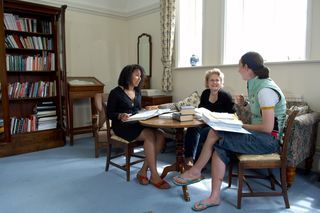First year Ancient History at Newnham. What do we do?
Every year one of my favourite bits of teaching is with my Newnham first year students (technically, I mean, Part 1A -- because a few of them have already done our Prelim course, designed for those without A level Latin, or equivalent, and so are in their second year at Cambridge). First-year teaching is fun (and hard) because you are trying to educate (in the technical sense.. ie not cram) a highly intelligent group of students, but they are being asked to make a very quick transition between school and university. To put it crudely, and a bit unfairly to A levels, they have quickly to become independent learners (with support and guidance); they have to discover what it is to explore a historical topic without knowing that there is a checklist of criteria whose boxes they have to tick in order to get a first, 2.1 or whatever; and they have to discover that intellectual inquiry is open-ended, exciting, difficult if you do it well, and that it MATTERS.
So what do I get them to do for their first piece of supervision (ie tutorial) work?
Well, 15 years ago, I used just to set a 'straight' essay... something like a "How useful is the evidence of Lysias 1 for the position of women in Classical Athens?', appending a bibliography which gave them (albeit indirectly) the answer. There were, in fact, some good lessons here. Lysias 1 (on the murder of Erastosthenes) was a first year set text, and they learned a lot about it and about the position of women in classical Athens. Not bad.
But they didn't learn much about exploring for themselves (they followed the bibliography I had given, rather over dutifully, despite exhortations to follow up other stuff they came across) and they didnt learn much about the overall picture. Ask them about Lysias and they would know a huge amount. Ask them about Solon and they were likely to look blank. OK, they had lectures which covered Solon, but (so far as I have observed) attending lectures conscientiously never quite hits the spot in the brain that writing an essay (vel sim) does.
So I starting trying something rather different for their first piece of univeristy work in ancient history. For a few years, I would ask them to go away and write me a history of the ancient world (8th century BC to fifth century AD) in 1500 words. This was great for a bit. They learned quite a lot, and produced mostly rather conservative stuff. But you could really open it up in the supervision -- pointing out that half of them had not mentioned a single woman or slave, or that their view of 'the ancient world' had been entirely Greco Roman.. etc etc
The trouble was that this assignment got to be part of the student mythology, so by the time the new first years arrived in my room, the second years had already tipped them off about what I was likely to ask. So this year I rang the changes, I gave them all a short essay to write on why the 'Old Oligarch' (another set text) might be the best guide to fifth century Athenian democracy that we have (they had a decent bibliography and I gave them a 30 minute supervision, one to one, on what they each had written). But for our communal class, all together, I set a rather different exercise.
I gave them two inscriptions from the Athenian fifth century, in Greek (and with a translation), and I asked them to come back prepared to say what these texts were and why they were interesting. I gave them no bibliography (though if they looked carefully at the introduction to the translation they would have seen a few hints). I said I didn't mind how they found out about them.. asking mates, googling, discussing together, reference books .. but I wasn't going to help. (The inscriptions, by the way, were the records of the property of the Hermokopidae ('mutilators of the herms') auctioned after their trial, IG I/3, 426 and 30) and the Athenian regulations for Chalcis, Meiggs/Lewis 52.)
To be honest, they looked a bit horrified when I explained this task (yes, you did!) . Most of them had never seen a Greek inscription before, didn't even know they existed, I guess. And, in fact, when I explained to my own old Director of Studies (Joyce Reynolds.. gradually on the mend, by the way, after her hospital stay) what I had set for the first years, she said that she thought it was rather a 'stiff' exercise. (Frankly, I thought this was a bit rich. Back in the mid 1970s we had learned amounts from her by being given much more impossible tasks.)
Anyway a week later, they came to their joint supervision, brilliantly prepared to talk about these texts. They had got together, they had shared their knowledge, they had googled and explored the library.. and they could really talk about what these utterly unfamiliar inscriptions had to say. And they had learned a little bit about what research was really like, and they hadn't just followed the bibliography (because they didnt have one!). I was delighted, and they were really launched I think.
So next year, I shall do something similar -- though I shall have to shake up the texts, otherwise these kids will just pass on their expertise to the new girls next year. "Ah yes, we did that.. what you need to say is..."
Mary Beard's Blog
- Mary Beard's profile
- 4112 followers




